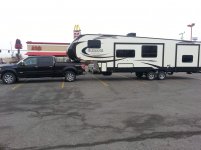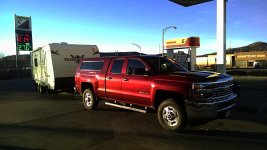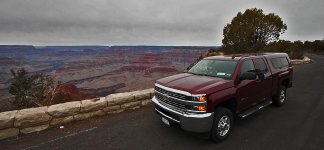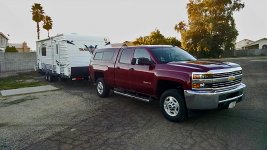I would be the last to be critical of someone overloading a truck

been there done that. However I've known prior to the event what I was doing and made an informed decision to do so. There are many out there that don't know the danger having been misled by RV salesmen, and even truck salesmen, and are unprepared to handle emergency situations. An overloaded vehicle does not in itself mean that an accident WILL occur, but the chances of it happening increase as the skills of the driver decrease.
I pulled up the full 2014 Ford Spec sheet,
http://www.ford.com/trucks/f150/2014/specifications/ without knowing the wheelbase, engine, towing pkg, etc. I can only assume some items. However on that year the MAXIMUM cargo capacity was 3120#, and most of the Eco Boost models were much less. The pin weight on your truck will run from 15-25% of the GVW of the trailer. I used 20% as an average which brings up 2350# cargo load. Working backward using your numbers, the only match I could find in the EB with 7700# GVW, showed your cargo capacity of 1840# which includes fuel and passengers. Adding in 700# for hitch, fuel, passengers and a little luggage, would put you at 3050# or 1200# over. That same model has an 11000# gross 5th wheel tow capacity, which you're 700# over there.The addition of air bags will offset the sag from the overload, but does not increase the capacity of the truck. On your tires, I forgot that they switched to the 17 and 20 inch rims which actually have a higher weight rating then the 16 inch models. I would suggest you use the link to the Ford specifications to carefully calculate the totals for "your specific model", to make an informed decision as to the suitability of the combination for your application.
Using my combination and numbers, I have a 5th wheel with a MFG GVWR of 14,000#. My 2006 F350 DRW 4x4 Crew Cab long bed with 4.10 rears and 6.0 diesel has a 16,700#, 5th wheel tow capacity, which puts me at 85% of capacity, leaving 15% reserve. Using a 20% factor, my pin weight would be 2800#. Adding in passengers, hitch, fuel, extra fuel, junk, (I carry a lot of extra) etc... I calculated a total cargo weight of 4000#. My model truck is rated at 5800#, so I'm at 69% of capacity. The base curb weight of my truck is 6615# plus cargo load 4000# is 10,615#. The GVWR of my truck is 13000#, so I'm at 82% of capacity there. With 6 tires on the ground I'm less than 75% of capacity running 75# of air. The Combined Vehicle Weight Max of my unit is 23500#. With a total CVW of 21815#, I'm at 93% of capacity. I would prefer a 10% margin but considering the other margins, it's still a stable, safe vehicle combination.





